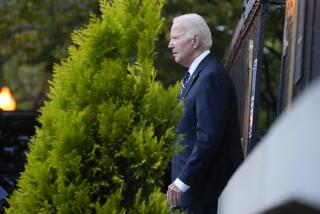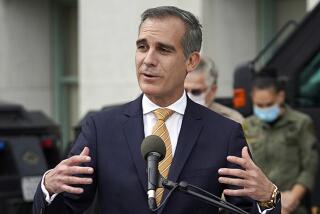Boren’s Role in Efforts for Gates Questioned : Intelligence: Some on Capitol Hill wonder if the senator sought letters of support for the CIA nominee.
WASHINGTON — An eleventh-hour effort by the White House to shore up support for Robert M. Gates’ nomination as the nation’s intelligence chief has won endorsements from only three of five former CIA directors while raising questions on Capitol Hill about the role of Senate Intelligence Committee Chairman David L. Boren (D-Okla.).
The campaign for letters of support--hurriedly mounted over the weekend--probably will have little effect on how the committee votes on Gates’ nomination to be CIA director, according to Boren, who said that the nomination is still “up in the air” and could be approved overwhelmingly or recommended for rejection.
Boren, in an interview, downplayed the significance of the letters and said that “first-hand testimony under oath will have the greatest weight on me and other senators.”
Several Democratic sources on Capitol Hill suggested that Boren himself was behind the campaign for endorsements and one former CIA official, who declined to be quoted by name, said that he believes Boren initiated the campaign so he could cite the letters in explaining to fellow Democrats why he plans to vote for Gates.
However, Boren declared that he is still undecided on Gates and flatly denied having any part in seeking the letters. In fact, he said, he has talked to none of the former directors and was not even aware that the White House had sought the letters, which were addressed to him.
Brent Scowcroft, President Bush’s national security adviser, who personally solicited the former directors’ help, also denied that Boren was involved.
“It was basically my idea,” Scowcroft said. “What I said when I called them was that I thought it would be useful for Boren to have the letters. It may have been garbled, but that was not my intention.”
Former CIA Directors Richard M. Helms, William E. Colby and William H. Webster all wrote letters of endorsement. But neither James R. Schlesinger nor Stansfield Turner has endorsed Gates. Both apparently oppose his nomination, but neither has taken a public stand.
White House strategists, worried that support for Gates might erode while he awaits the committee’s vote on Oct. 18, first began discussing the possibility of seeking endorsements from former CIA directors about 10 days ago.
Throughout the Gates’ hearings Boren has portrayed himself as a neutral moderator, drawing a clear line between his own well-known sympathies for Gates and his chairman’s responsibility to give both sides equal time to make their arguments. Both sides agree that he has conducted the hearings fairly.
However, Gates’ opponents on the committee, according to one source, are embittered by what they suspect has been Boren’s “covert collusion” with White House efforts to get Gates confirmed.
Sen. Dennis DeConcini (D-Ariz.) complained last week that the seven Republicans on the 15-member committee had “circled their wagons around” Gates, politicizing the hearings before they started.
“It’s pretty clear now,” a Democratic committee aide added, “that Boren’s wagon has joined the circle.”
Both sides in the confirmation fight have acknowledged that, in terms of influencing votes on the floor, the key among the undecided senators lies with Sen. Sam Nunn of Georgia, chairman of the Senate Armed Services Committee and the second ranking Democrat on the Intelligence Committee.
The other undecided senators--DeConcini and fellow Democrats Alan Cranston of California and John Glenn of Ohio--are not regarded with as much concern by the White House as Nunn, who Administration strategists calculate will carry as many as 10 other votes when the nomination goes to the Senate floor.
More to Read
Get the L.A. Times Politics newsletter
Deeply reported insights into legislation, politics and policy from Sacramento, Washington and beyond. In your inbox three times per week.
You may occasionally receive promotional content from the Los Angeles Times.










